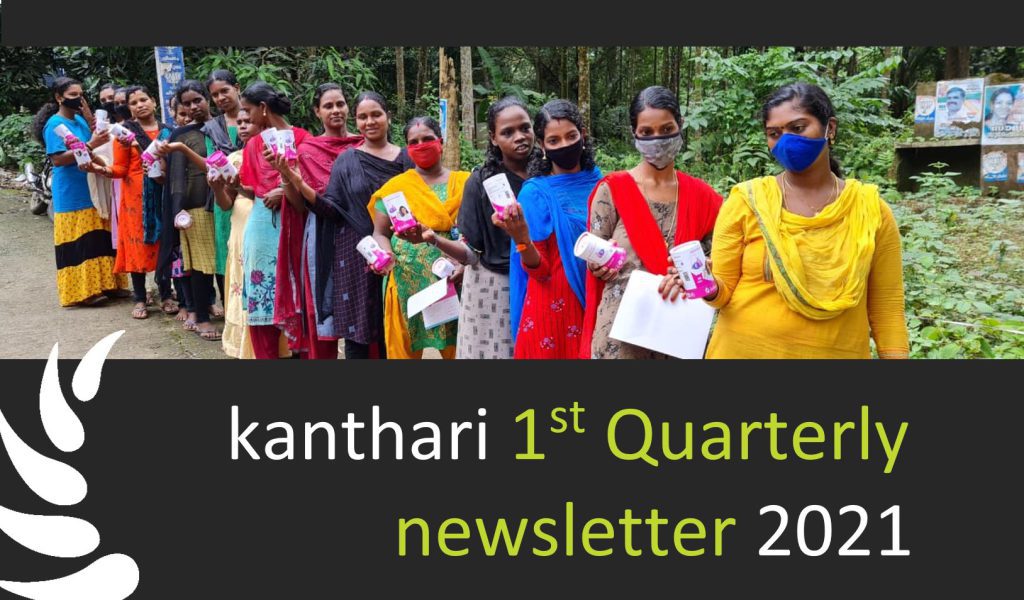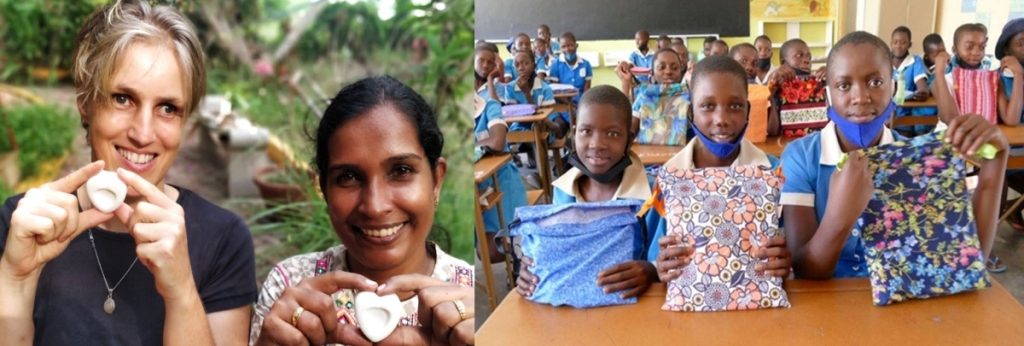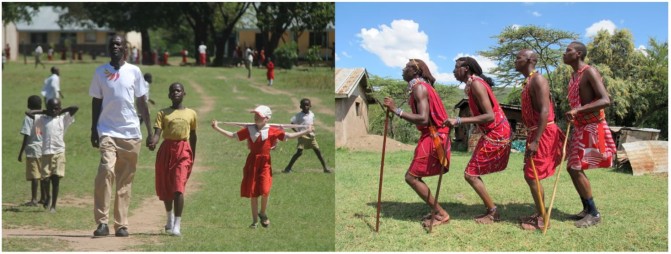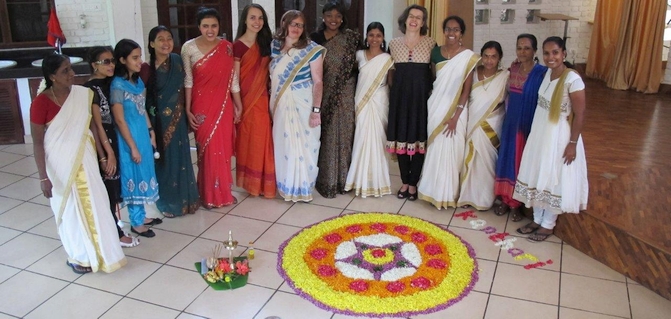“It doesn’t matter how slow you go, as long as you don’t stop” – Confucius
The past year has surely affected you and everyone else, everywhere. From the 25th of March 2020 when the lockdown in India started, life as we had known it, changed. We were forced to adapt to the new situation, and we did. We started the kanthari Corona blog in which we wrote how kanthari as well as kanthari graduates and their target groups were affected and how they dealt with the pandemic.
We started an emergency fund through which we supported thousands of people on the margins of society who were/are facing existential needs. If you wish to support us with this, you can donate here. Thank you for your support!
The lock-down gave us an opportunity to finally realize a long planned ‘kanthari spice box – encyclopedia for change’ with 100+ chapters, and more than 1000 subchapters, many illustrations, pictures, downloadable templates, and sound files.
We continued lake cleaning activities and during this process we started to think of useful items that could be made from water hyacinths; this resulted in the birth of the biodegradable hyacinth-diaper-project that is still ongoing. (more details further below).
And finally, we restructured the curriculum, added some workshops on social entrepreneurship, and we are now an authorized training centre of the vocational training programme of Bharat Sevak Samaj (BSS), which is part of the National Development Agency promoted by the Government of India.
Due to the Corona Pandemic, we will now start the 12th kanthari course in April online and by the end of May, we expect the participants to arrive on campus. So, we are ready and excited to get going with a new batch of change makers
Updates from kanthari alumni
Peace Crops – Cameroon – Njeke Joshua – 2019 kanthari
Peace Crops works with war affected communities, schools, and other entities to practically carry out agriculture projects. Joshua’s series of organic farming campaigns promote agriculture as a peace building tool as part of a solution to the civil unrest in Cameroon as well as to educate communities on the causes and effects of climate change both at local and global levels and advocating for better mitigation policies. His rehabilitation and correction projects aim to equip displaced orphans with the knowledge needed to combat unemployment, hunger and to stop the ongoing conflicts.
Additionally, Joshua was able to provide 1500 Covid-19 emergency intervention food baskets in poor rural areas. Peace Crops

Tharunam – India – Lingala Naresh – 2017 kanthari
Lingala Naresh works on a mission to use food as a medium for Social Change and make it universally accessible and affordable. Young farmers in the village advised him to stay away from farming and even his parents do not like to see him as a farmer. To address consequential damages of agricultural and climate crisis, he started a unique ‘Food Literacy’ campaign. The goal is to spread knowledge of growing food while understanding its impacts on health, environment, and sustainable economy. Naresh started his work with schools, but the covid-19 pandemic changed this plan, pushing him to work on digital strategies. Currently, he is working on a web portal on food literacy while promoting ecologically feasible and economically viable models for farmers. www.tharunam.org
Nhanga Trust – Zimbabwe – Chipo Chikomo 2013 kanthari
Through the partnership of Nhanga Trust with Days for Girls International she manufactures washable sanitary pads. During the Covid-19 pandemic she saw an opportunity to add to her product line by making washable face masks. She has provided the masks to organizations like the World Health Organization in Zimbabwe and with every purchase of the washable pads she includes a free washable face mask. http://daysforgirls.org/
Elefant in the Room -India – Aparna Gopan – 2017 kanthari
Aparna Gopan is the founder of “Elefant in the Room”, a provocative movement which runs
campaigns against taboos such as sex education and female genital mutilation. She has been running campaigns across all major Southern Indian cities. Currently the focus is on campaigns against domestic violence and abuse against women and children as well as a digital campaign against Gendered Cyber Bullying. Both these issues have seen an increase since the start of the pandemic.
The major running campaign is with the tribal communities in Kerala. The elefant team observed that during times of crisis, Menstrual hygiene and Reproductive health takes a backseat in the tribal settlements of Neyyar Dam within the capital city of Kerala. Due to the recurring Kerala floods (since 2018), accompanying landslides and now Covid-19, these tribal settlements are unable to access their basic menstrual and reproductive rights. While there were many contributing factors, the main root cause was their geographic and socio-economic placement within the society. And of late, as a dangerous CSR gimmick, many corporate companies are flooding this protected forest environment with disposable plastic pads that are harmful for the users as well as the environment. www.elefantintheroom.org and on social media @elefantishere.
Ecofriendly alternatives
Over the past few months, we have continued to look at solutions that contribute to a greener environment. The incredibly fast-growing water hyacinths cause a threat for many water bodies, so we looked at how these plants could be used to solve other problems. We noticed that the roots of the plant absorb a large amount of water and this led to the birth of the biodegradable diaper research. Till date Riya Orison has gotten to the stage where we have a diaper-pad, made of raw cotton and roots of the Water Hyacinth. And we have a diaper pad holder, made from dried stalks of the water hyacinth. The one time use diaper-pad can be thrown into the biogas plant or in the compost heap. The diaper holder can be used multiple times and is also fully biodegradable. Salini started to explore how to make eco-friendly soap and how to create fragrances from the plants/trees and flowers that are found on our campus. We keep looking for further eco-friendly solutions.
kanthari in the media:
Several kantharis were interviewed by Yampier Aguiar Durañona of the Giraffe Heroes foundation Stick Your Neck out podcasts. Click on the links to listen to each episode:
– Anja Paffenzeller To Fly like Bats (Brasil)
– Harriet Kamashanyu’s Rhythm of life (Uganda)
– Lorena Julio’s message of inclusion and equality (Latin America)
– Limbi Tata Blessings’ Ecological Balance for Cameroon
– Aparna and Ruang addressing cultural taboos (India/Thailand)
– Yoshimi Horiuchi about the power of books (Thailand)
– Jane Waithera’s Positive Exposure (Kenya)
– Karthikeyan’s Sristi Village, changing attitudes (India)
– Faruk Musema’s Reverse Inclusion (Uganda)
– Kapila Rasnayake’s world without Gender (Sri Lanka)
– Sabriye Tenberken was interviewed by Amanda Bakker in the female Boss podcast
– An article written by Pragya Raut about the kanthari campus was published on the ecopreneur
We are excited that the 12th kanthari course is about to start and we wish to thank you for your ongoing support and for sharing this newsletter with family, friends, colleagues and within your network!
We hope that soon enough the pandemic will be over. Till then, please take good care, stay safe and stay healthy!
with very best regards from Kerala, India,
the entire kanthari team, sabriye and paul
Do you want to support the work of kanthari?
You can do that here – THANK YOU VERY MUCH!
www.facebook.com/kantharis – localhost/kanthari




